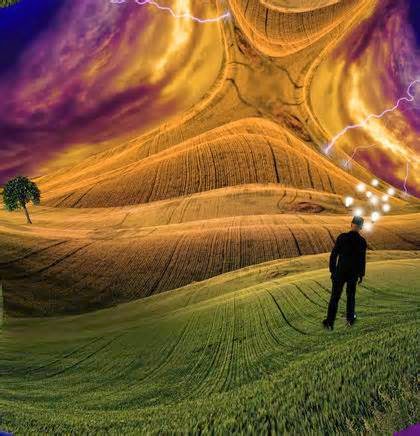Sundog Rising!
Reflections on living the life literary by the Urban Sundog
babble on: upping the objective reality
There’s a very terrible old philosophical one liner. If Helen Keller was alone in a forest and she fell over, would she make a sound?
Tying in naturally to the philosophical argument that if there is no human nearby capable of perceiving an event, does it really happen? Is the world only defined by our five senses and nothing else? The more traditional question of course being, if a tree falls over in a forest and there’s no one there to hear it fall, does it make a sound?
This also links to the always popular undergrad discussion at parties when you’ve had a few concerning “Hey! Is that wall still there, if none of us are looking at it?” A conversation I’ve known to drive intelligent young women screaming from the room swearing off young men forever.
How did we come up with such an egotistically human-centred theory in the first place? Most people who get caught up in the discussion blame Descartes. The Cogito Ergo Sum guy. Let’s summarize it this way, as I did once before in my UFO blog actually:
Taking for granted there is an objective world still there even when we’re not looking at it (because let’s face it, if the wall did disappear when you looked away your house would fall over), a generally accepted philosophical assumption regarding perception plays out something like this:
There is the Perceiver, who has perceptions and attempts to interpret and
integrate them into a working model of the world.
There are the Perceiver’s Perceptions, which may be faulty but
ultimately consist of his sensory responses to the outside world. This is what
I see, I hear, I smell, etc.
There is the Perceived, which is the objective, external world in its own
right that our senses do not always reflect accurately.
Rene Descartes did start all the fuss back in the Seventeenth Century regarding how much we can or cannot accept of what’s going on around us when he decided all a person can really trust to build consciousness upon is number two, the Perceiver’s own Perceptions. And it’s rather important to a human to build consciousness.
After all the way you build your consciousness defines your personality.
Your brain sifts through sensory input from Moment One of your existence and every moment after to put you together. The choices and decisions you make regarding sorting your sensory input into what is acceptable and what is not -- done sometimes unconsciously -- construct your particular point of view on life. Choices you’ve made in the past will influence the choices you make now and in the future.
So what you’ve got going on is a mutable world you only take in through fallible senses upon which you subconsciously and consciously base the decisions which literally define who you are and what you are going to do in life.
Maybe not the best system, but I would argue really the only one we have.
Except …
I had a fascinating discussion with my son the filmmaker last week. He plunges into some of the murkiest dives in Winnipeg to record the exploits of the ever-frenetic grindcore music scene. Since he first embarked on this adventure five years ago, his equipment has grown more and more sophisticated. To the point now, he explained to me, that the camera he uses records more of the objective scene he films, no matter how badly lit, than he is capable of seeing himself with his human eyes, or through the viewfinder of the camera as he records it. Layers of information regarding light defining the objective reality of the musical sets he films are stored in the camera as he films. Which he can activate in post production and bring to perceivable vision for our poor, inadequate human senses to see on the computer afterwards.
https://www.youtube.com/watch?v=QtyGCxD73XQ&feature=youtu.be
This is not taking a film and enhancing it afterwards to add something to its appearance. This is taking the digital recording and bringing out a definition of the concert’s reality already layered within the film that was always there no one who was in the room the concert took place in at the time was capable of perceiving!
https://www.youtube.com/watch?v=Rmbv7PEkKqg
Reflecting on the implications of this statement totally freaks me out.
The machine defines reality more capably than we do.
It’s not a matter of asking “if the machine can’t take a picture of that wall, is the wall still there?” It’s a matter of stating that the machine sees walls there that we can’t.
Machines outdoing human objective perception is nothing new of course. I know from my own forays into digital photography that when I get the picture home and up on the computer, the camera has captured infinitely more detail in the scene than I was capable of seeing when I took the picture.
But that detail wasn’t hidden from my perception. I knew things were there, my glasses just aren’t strong enough for me to see them clearly. My son’s camera layers in information from darkness that no human can see. And he needs to do something special to free that level of observation within the machine for a human to perceive at all.
Even though I’m certain this idea isn’t revolutionary for those within the industry, for the first time the concept of the scope of observation possible to a machine compared to a human comes home to me. Somehow if you relate it to sight, it always seems to mean so much more.
Because if, as Descartes says, all a human can really trust to build his consciousness upon is the perceiver’s own very fallible perceptions, and the machine has such a wider range of less fallible perception than the human does …
Well. The Turing Test posits the idea that an artificial intelligence can be considered to have attained consciousness if it can fool a human into thinking that it’s another human.
But it seems unlikely that a human could fool a machine these days into thinking it was another machine. The human mind doesn’t perceive reality on a broad enough scale. So what if the test is turned around on us?
This bears further thought.
Check out my son’s blog on filming the Winnipeg Grindcore festival Arsonfest three years running at:
http://nascencyproductionsfilms.wordpress.com/2014/09/01/upcoming-movie-grindcore-filmmaking/
***************
REALITY FICTION AND BEYOND!
This week:
Continuing The Twitchy Gal with Chapter Fifteen posted on Monday and Chapter Sixteen coming on Friday, October 3rd at:
http://realficone.blogspot.ca/
Brenda is unpleasantly surprised. As a number of other people are revealed unexpectedly, with the emphasis on revealed. And Clare’s getting twitchier. Which raises the twitchiness factor in the characters around her as well.








No comments:
Post a Comment